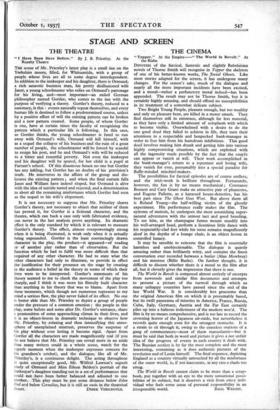THE CINEMA
" Topper." At the Empire—" The World In Revolt." At the Rialto
DEVOTEES of the farcical, fantastic and slightly Rabelaisian novels of Thorne Smith will recognise in Topper the skeleton of one of his better-known works, The Jovial Ghosts. Like most stories adapted for the screen, it has undergone many changes. For the censor's sake, much of the dialogue and nearly all the more important incidents have been excised, and a moral—rather a perfunctory moral indeed—has been appended. The result may not be Thorne Smith, but it is certainly highly amusing, and should offend no susceptibilities in its treatment of a somewhat delicate subject.
Two Bright Young People, pleasant enough, but too wealthy and only on pleasure bent, are killed in a motor smash. They find themselves still in existence, although far less material, as they have only a limited amount of ectoplasm with which to become visible. Overwhelmed with a desire to do the one good deed they failed to achieve in life, they turn their attentions to a respectable and henpecked bank-manager in order to free him from his humdrum inhibitions. This good deed involves making him drunk and getting him into various highly compromising situations, which are exploited with all the ingenuity made possible by the fact that the coupe can appear or vanish at will. Their work accomplished in the bank-manager's return to a repentant and loving wife, they vanish for ever, presumably into a special paradise for fluffy-minded mischief-makers.
The possibilities for farcical episodes are of course endless, and the trick-work is brilliant throughout. Fortunately, however, the fun is by no means mechanical ; Constance Bennett and Cary Grant make an attractive pair of phantoms, and Eugene Pallette, as a harassed house-detective, has his best part since The Ghost Goes West. But above them all is Roland Young—the half-willing victim of the ghostly experiment. His performance really makes the film. The epitome of meiosis, he undergoes the most astonishing super- natural adventures with the utmost tact and good breeding. To see him, as the champagne fumes mount steadily into his well-arranged head, perform a licentious little dance with his respectably-clad feet while his torso remains magnificently aloof in the depths of a lounge chair, is an object lesson in controlled lunacy.
It may be sensible to reiterate that the film is essentially harmless and unobjectionable. The dialogue is quietly amusing rather than brilliantly witty, and contains the finest conversation ever recorded between a butler (Alan Mowbray) and his mistress (Billie Burke). On further thought, it is difficult to discern whether there is a moral to the film after all, but it cleverly gives the impression that there is one.
The World in Revolt is composed almost entirely of excerpts from newsreels and similar film documents and attempts to present a picture of the turmoil through which so many unhappy countries have passed since the end of the last World War. It is considerably less gruesome than the original American film on which it is presumably based, but its swift panorama of miseries in America, France, Russia, Cuba, Italy, Germany, Austria and the Far East certainly piles up into a hideous indictment of the modern word. The film is by no means comprehensive, and is too late to record the crowning horror of the Japanese air-raids, but nevertheless it records quite enough even for the strongest stomachs. It is a strain to sit through it, owing to the ceaseless orations of a gang of commentators—most of them transatlantic—but it must be said that both in word and picture it gives a not unfair idea of the progress of events in each country it deals with. The Russian section is by far the most complete and the most interesting, containing as it does authentic pictures of the revolution and of Lenin himself. The final sequence, depicting England as a country virtually untouched by all the misfortune of the outer world, is, if not inaccurate, at any rate a shade too smug.
The World in Revolt cannot claim to be more than a scrap- book, put together with an eye to the more sensational possi- bilities of its subject, but it deserves a visit from every indi- vidual who feels some sense of personal responsibility in an






































 Previous page
Previous page